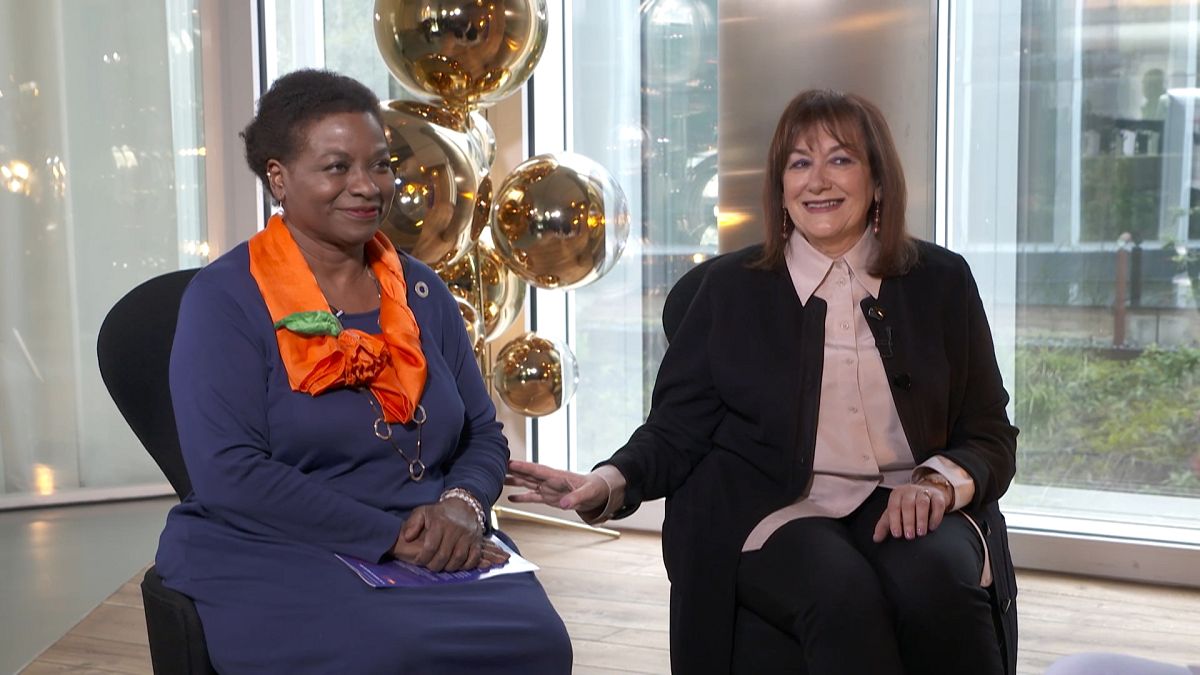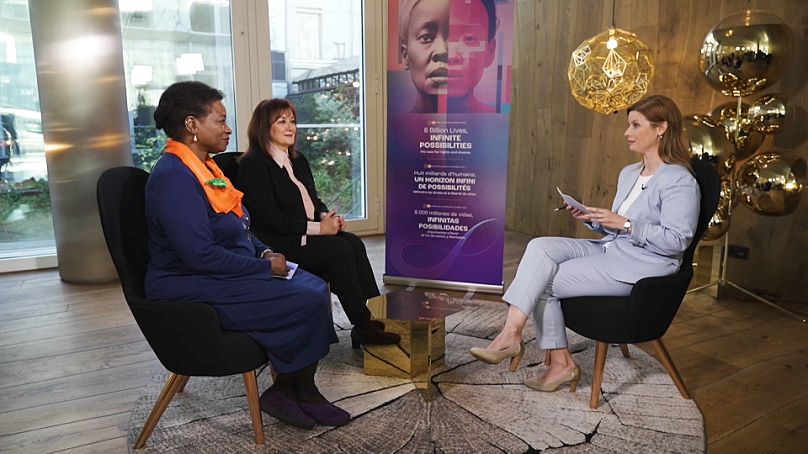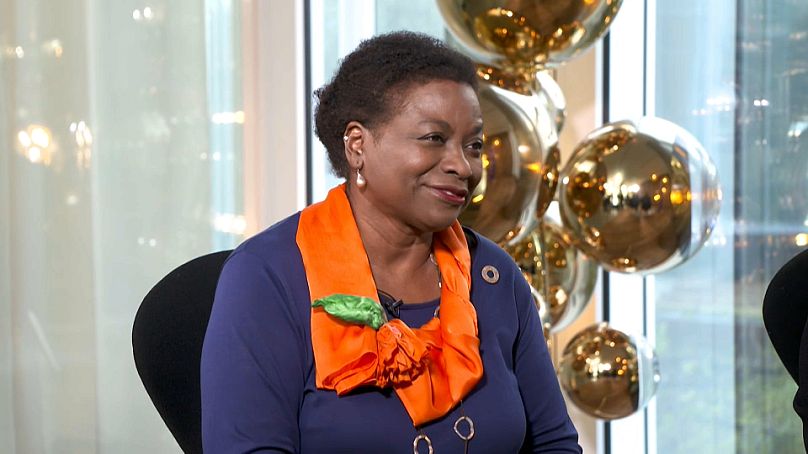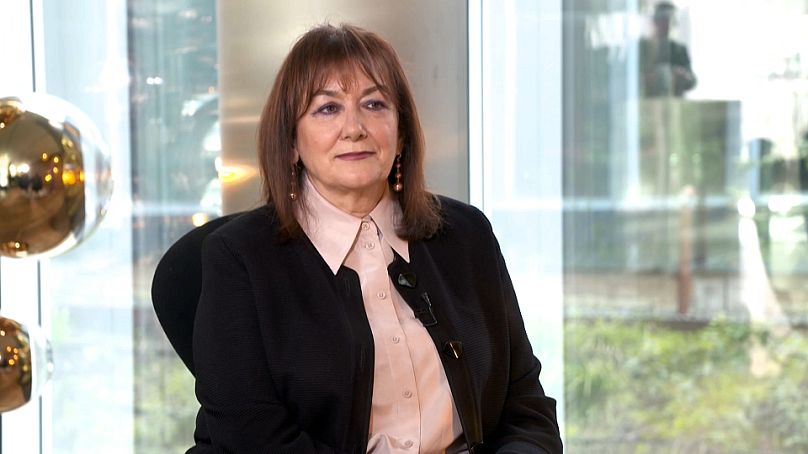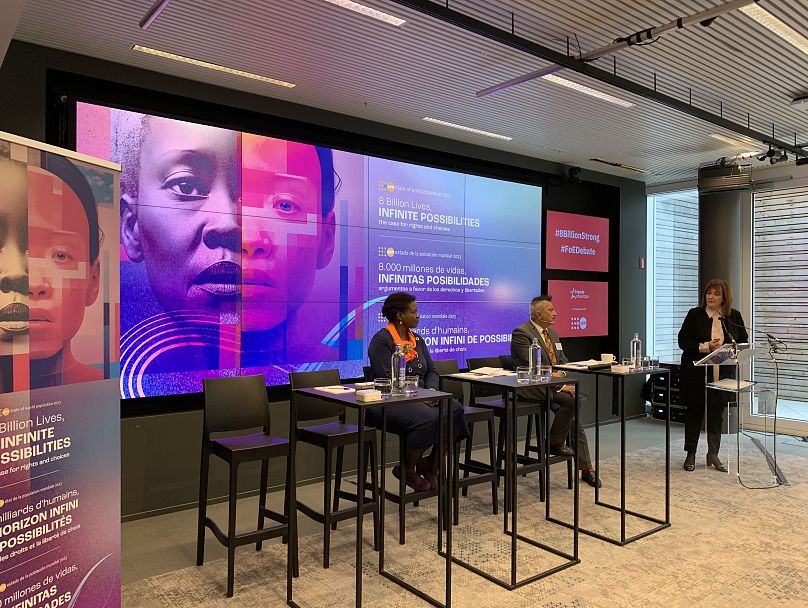Euronews speaks to United Nations Population Fund Executive Director, Natalia Kanem, and European Commission Vice-President for Democracy and Demography, Dubravka Šuica, to discuss the opportunities and challenges of 8 billion people on earth.
The global population reached 8 billion on 15 November 2022, according to the United Nations' World Population Prospects 2022 report.
This milestone presents both huge opportunities, but also considerable challenges for humankind.
"[It] is an occasion to celebrate diversity and advancements while considering humanity's shared responsibility for the planet,” said UN Secretary-General António Guterres.
In our latest episode of the Global Conversation, with the help of Friends of Europe, Euronews sat down with the United Nations Population Fund Executive Director, Natalia Kanem, and the European Commission Vice President for Democracy and Demography, Dubravka Šuica to discuss what this all means for us.
Isabel da Silva, Euronews: The United Nations Population Fund has just published the State of the World Population Report. India overtook China as the country with the largest population. It will keep growing very fast. I would like to ask Madam Executive Director, which are the other findings that would you would like to highlight?
Natalia Kanem, United Nations Population Fund Executive Director: "There are two things that I'll say. One is the world population is reordering itself. We're living in a period where there's so much diversity. Some countries have a mean age of 50, others a mean age of 15. But my real point is that everywhere there seem to be these alarm bells going off. [The] world population [is] too big, [or] too small. Women will make their own decisions and we should support them in the fertility that they wish to have."
Isabel da Silva, Euronews: Madam Vice-President, the European Union has only 6% of the world population and faces a declining trend, which will have a huge impact in terms of financing welfare and the pension system. Considering that the French population is so angrily reacting to reforms in these fields, what are the solutions?
Dubravka Šuica, European Commission Vice-President for Democracy and Demography: "There are different ways to find a solution, as you said. [The] first one is that we want to use our cohesion policy in the best possible way, in order to create an environment for families to thrive. Then, I have to mention artificial intelligence and robotics, which is very important and can sometimes replace humans. But I don't say that this is the only solution. And the third one is managing legal migration.
Isabel da Silva, Euronews: How can we integrate migrants in a way that is positive for them and for our societies?
**Dubravka Šuica, European Commission Vice-President for Democracy and Demography: "**I think that solidarity is of utmost importance and we have to push for it. And I think that Europe is based on solidarity. So, we have to do more on this, prepare them (migrants) to integrate better when they come, [be it] with learning languages or different skills. Reskilling, upskilling. You know that we are now in the European Year of Skills and for the two transitions, digital and green, there are new jobs and it's very important to have skilled people for new jobs, for new green jobs. So, this is something which should be done in advance before they come to our member states."
Isabel da Silva, Euronews: How can we explain this anxiety about the fact that we are now 8 billion?
Natalia Kanem, United Nations Population Fund Executive Director: "The population dynamics of the moment is a world of great movement. And when we look at the dynamics of what creates that movement, we see that there's one axis of conflict and people feeling that their microcosm is unsafe.
"Now climate is another push for people to leave where they are and seek a better life elsewhere. So, we need to look for climate solutions, and we also need to put peace at the centre.
"The other piece of it is that this is the first time in human history when there's so much divergence. In fact, two-thirds of us live in places where the population will decline looking towards the year 2050. But there's still one-third of us in places where the population is growing very rapidly. There are a lot of women in developing country settings who still cannot get contraception."
Isabel da Silva, Euronews: European women face, obviously, different challenges, but there's still some discrimination in terms of access to the job market, in terms of wages. They also make up for, I would say, 90% of the workforce for health and social care. When we talk about women's empowerment and respecting their rights, what is missing?
Dubravka Šuica, European Commission Vice-President for Democracy and Demography: "The Gender issue is a big issue in [the] European Union and we have to deal with it. Eight million European women don't work at all, although they have their careers, they have their CVs, but they can't work because they cannot afford either kindergarten or nursery home, for either their parents or for their kids. So we lack 8 million European women in our labour market because of this. We have to take care about the infrastructure, we have to care about this profession of caregiver, which, I must say, should be better respected, and should be better paid, because this profession is undervalued and we have to take care of this."
Isabel da Silva, Euronews: But I would say that, maybe, other groups are also still overlooked. I would say people with disability and people with other issues. Even among elderly people who still want to be active in work, they find it hard to find a job or be able to contribute. Does there also have to be a mindset change?
Natalia Kanem, United Nations Population Fund Executive Director: "Exactly. And that is the point about the 8 billion and the infinite possibilities. If we ask the right questions, your imagination takes you to solutions that are workable. And putting people's desires, what they want, at the centre has to be part of this equation.
"I also feel that it's a time of great change in technology. It's a time of great possibility to be able to use new methodologies that we have to invent. As you said, how can an older person, who can actively contribute, be in a situation that structures for their talents and their capacities? But most of all, I think it's really important to look at the young generation's desire to put the planet first, to connect all those dots across the Sustainable Development Goals, planet and future. So, this means that we have to plan more intelligently and ask better questions.
Isabel da Silva, Euronews: My last question is: will this vision also be a solution for the socially and economically depressed regions in Europe? You know, there's a lot of dynamics in the urban areas, but a lot of rural areas in many European Union countries are getting very depressed in all sorts of ways.
Dubravka Šuica, European Commission Vice-President for Democracy and Demography: "This is something which our president, von der Leyen, wanted to have in the treaties: Intergenerational solidarity because we think it is important. Without that, our societies won't be fair, won't be equal.
"When we talk about rural versus urban, this is a big issue. 80% of Europe is geographically covered by rural areas and only one-third of our population lives there, which means there is huge potential in villages in the countryside, in rural areas. They are trying to invest and cover rural areas with 5G, with broadband, and internet. Without broadband internet, you can't imagine future jobs. And this is the reason why digital skills are very important nowadays. When you mention older people, they have to be skilful enough, so we are promoting lifelong learning in order to make older people capable of coping with the new technologies and with new styles of life."
